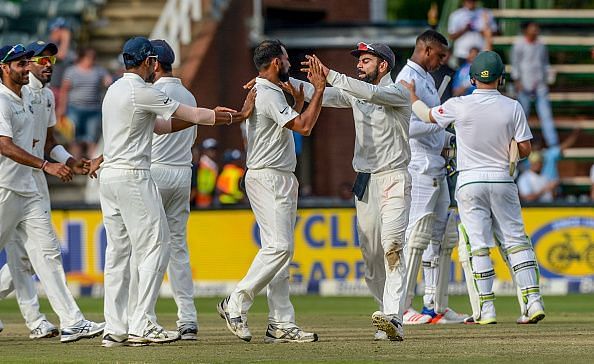
The Indian Overseas Situation
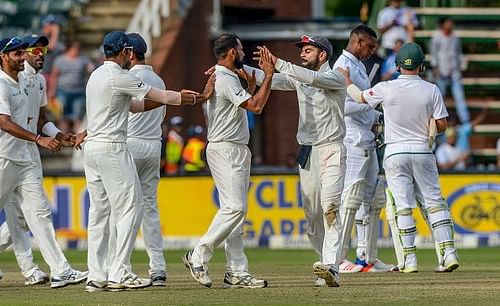
Since its debut tour of England in 1932, India has largely found it difficult to challenge the home team in the seamer-friendly conditions of England, Australia, South Africa and New Zealand. However, the tour of England in 2002 under Sourav Ganguly set the expectations for the new age team India. After a big loss at Lords in the first test, India bounced back in the third test at Headingley where Sachin Tendulkar, Rahul Dravid and Sourav Ganguly all got 100s to help India rack-up 628 runs in the first innings and win the match by an innings and 46 runs. The 4-match series ended at 1-1.
India continued their overseas mettle in Australia in 2004 when the home team had to fight hard to salvage the series with a draw in the fourth and final test to level the series at 1-1. Indians were able to better their performance in England in 2007 when they beat the home team 1-0 in a 3-match series, winning their first series in England since 1986.
Between 2002 and 2008 India did lose 3 series in these conditions- South Africa (2006, 2-1), Australia (2008, 2-1) and New Zealand (2002-03, 2-0). Even in these lost series, India achieved memorable wins at Johannesburg in 2006, when they bowled South Africa for 84 and in Perth in 2008 when they became the first Asian team to beat Australia at the WACA.
In March of 2009, India beat NZ comfortably by 10 wickets in the first test of a 3-match series at Seddon Park in Hamilton. India went on to draw the other two tests- eventually winning the series 1-0. A year and a half later, India managed to draw a 3-match series in South Africa during their 2010-11 tour just before the 2011 WC.
But since then, the Indian team has lost 7 consecutive series in England (2011 and 2014), Australia (2011-12 and 2014-15), South Africa (2013 and 2018) and New Zealand (2014). To run a comparison between the two Indian sides of my generation, I have divided them into two time periods. One between July 2002 till June 2011 and the other between July 2011 to June 2018.
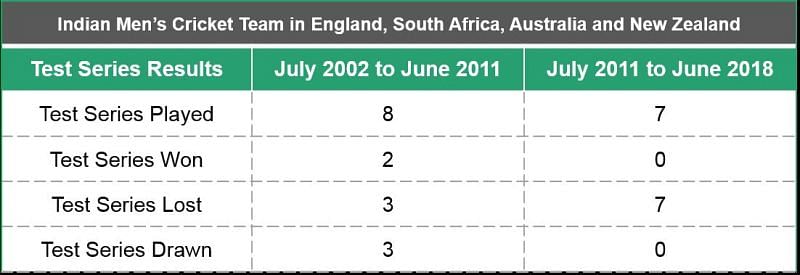
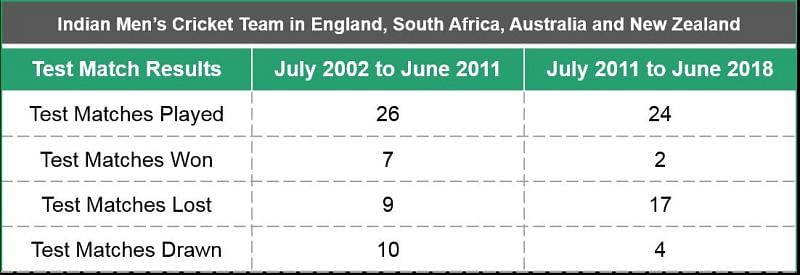
Having played almost the same number of matches in between these periods, the newer Indian side lost twice as many matches. With India being a team that has historically relied on its batsmen to deliver, I decided to analyze the Indian batsmen during these two periods:


Between these two periods, the difference between the averages of India’s top 7 batsmen is about ten runs. Moreover, the batsmen in the newer Indian team have found it difficult to put together big partnerships especially in the top of the order.
Tour of England for various teams during these two phases
Considering the next assignment for team India, let us shift our focus to performance in England only. To analyze it, I have looked at how India has fared in England in comparison to other teams that have toured England during these two periods:
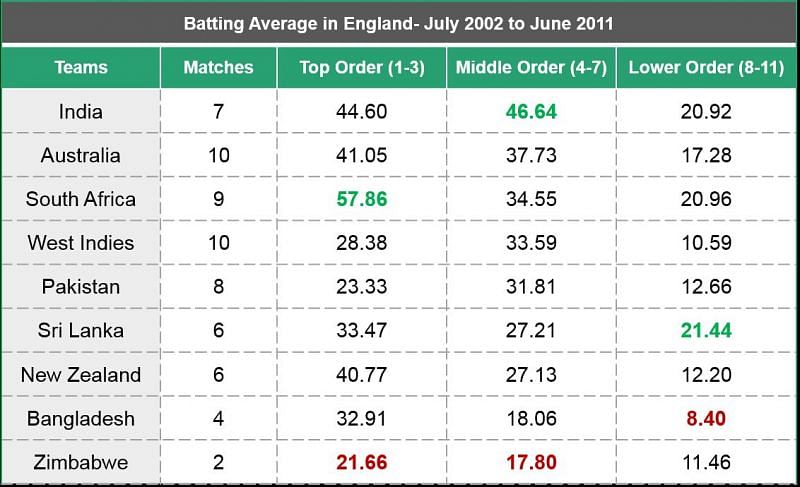
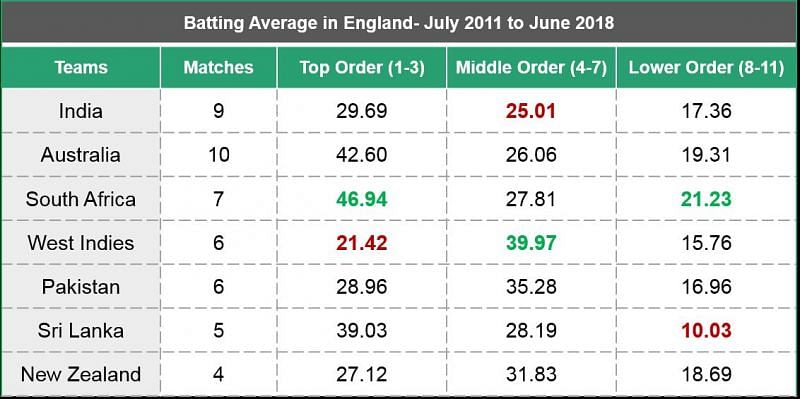
From being the best middle order among the touring parties before 2011, India has been the worst since then. The top order numbers would have been worse if not for Rahul Dravid’s one-man show in 2011. The story is the same when we look at century partnerships-
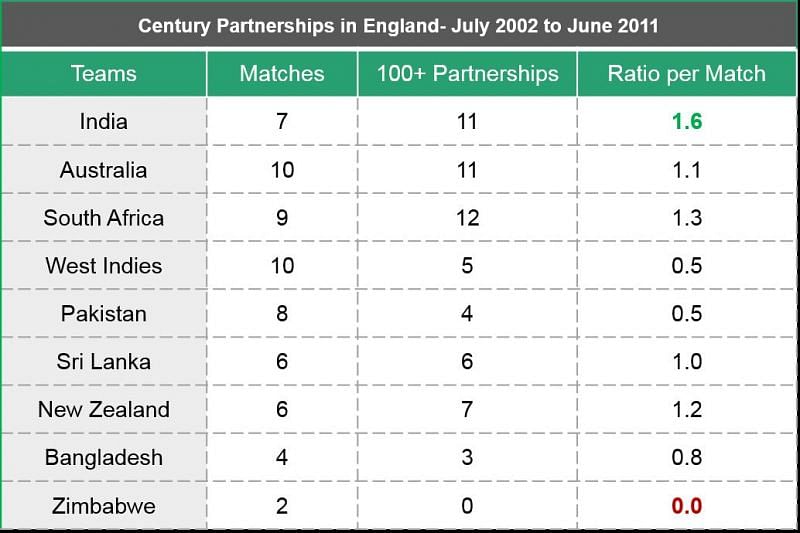
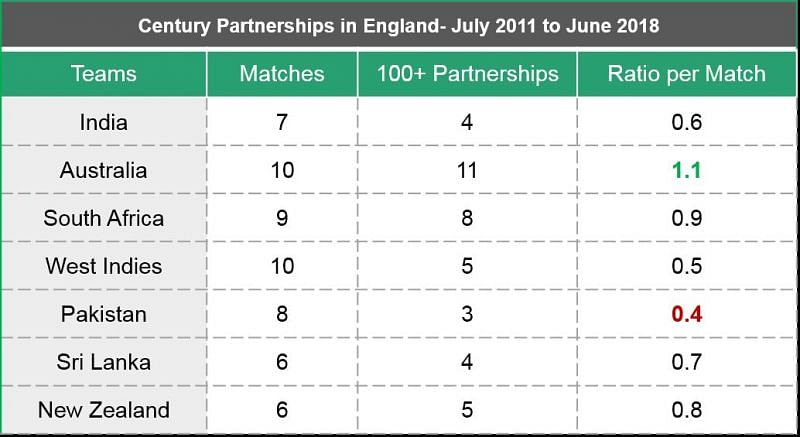
How can India turn things around?
In order to earmark an era of dominance both at home and away, Kohli and Co need to meet or even surpass the benchmark set by the Indian batsmen before them. Partnerships are going to be the key. India really needs to settle down on an opening pair instead of playing a rotating chair between the trio of Vijay, Rahul and Dhawan as it has been doing for some time now. Every team in the world that had dominated in tests home and away for some length of time had a solid and consistent pair- Haynes & Greenidge, Hayden & Langer, Cook & Strauss.
While India had a consistent middle order before 2011 with Dravid, Sachin, Ganguly and Laxman, the current situation of choosing people based on current form, which inevitably leads to selecting players based on performance in white ball cricket, has resulted in an unsettled middle order with only two out of the four positions settled. With Pujara at 3 and Kohli at 4, India should take this tour as a chance to settle on 5 and 6 if they want to build a team that will dominate away from home.
Dropping Rahane in South Africa was a big surprise and it did not work out. We will probably see him at 5 in all the five tests and beyond this series as well. As for number 6 and 7, it will most likely be a horses-for-courses sort of a situation. Karthik in for injured Saha can be a boost to the team’s batting strength and Pandya and Ashwin to follow can together make up for the 7th batsman. However, neither of them have a guaranteed place in the side given Pandya’s ‘bits and pieces’ image (especially if the track demands an extra spinner) and Ashwin’s track record on overseas tours.
To have a fighting chance in the coming series, the onus will be on the top order to not allow Anderson and Broad get into India’s middle order with the new ball. The middle order will need to do the heavy lifting in terms of scoring the runs by milking England’s first change seamers and spinners.
As for India’s bowling, this might be the most settled bowling attack that has toured England since 2007. If India’s batting can put them in a position to attack, we will be in for a month and half long treat.